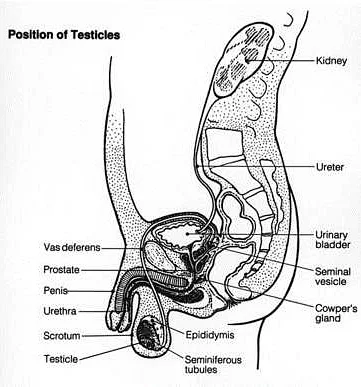Learn from Doctors How to Prevent Reproductive System Diseases
Содержимое
Learn from doctors how to take care of your reproductive system and prevent diseases. Get expert advice on maintaining reproductive health and avoiding common issues. Stay informed and protect your well-being.
When it comes to reproductive health, prevention is key. Taking proactive steps to maintain a healthy reproductive system can help prevent a wide range of diseases and complications. To get the best advice on how to protect your reproductive health, we turned to a panel of doctors who specialize in reproductive medicine. They shared their expert insights and recommendations for preventing diseases of the reproductive system.
One of the most important steps you can take to prevent reproductive diseases is practicing safe sex. This means using condoms consistently and correctly, getting regular screenings for sexually transmitted infections (STIs), and discussing your sexual health with your partner and healthcare provider. By taking these precautions, you can significantly reduce your risk of contracting STIs that can lead to serious reproductive health problems.
Regular check-ups and screenings are also crucial for maintaining reproductive health. Make sure to schedule routine visits with your gynecologist or reproductive specialist. These visits will not only allow for early detection of any potential issues, but also provide an opportunity to discuss any concerns or questions you may have. Your doctor can perform screenings for conditions such as cervical cancer, ovarian cysts, and sexually transmitted infections. Early detection is key in successfully treating and managing these conditions.
Preventing Diseases of the Reproductive System: Expert Advice

When it comes to the reproductive system, prevention is key. Taking proactive steps to maintain reproductive health can significantly reduce the risk of developing diseases and disorders. Here are some expert tips to help you prevent reproductive system diseases:
- Practice safe sex: Using condoms and getting regular screenings for sexually transmitted infections (STIs) can help prevent the spread of diseases that can negatively affect the reproductive system.
- Maintain a healthy lifestyle: Eating a balanced diet, exercising regularly, and avoiding excessive alcohol consumption and smoking can all contribute to better reproductive health.
- Get vaccinated: Certain vaccines, such as the HPV vaccine, can protect against viruses that can cause reproductive system cancers and other diseases.
- Practice good hygiene: Keeping the genital area clean and dry can help prevent infections that may affect the reproductive system.
- Get regular check-ups: Seeing a healthcare provider regularly for routine exams and screenings is essential for early detection and prevention of reproductive system diseases.
- Stay informed: Educate yourself about reproductive health, including common diseases and risk factors, to make informed decisions about prevention and treatment.
Remember, prevention is easier than treatment. By following these expert tips and prioritizing your reproductive health, you can reduce the likelihood of developing diseases of the reproductive system and enjoy a healthier life.
Understanding Reproductive Health

Reproductive health refers to the overall well-being of the male and female reproductive system and its ability to function optimally. It encompasses a wide range of issues, including fertility, sexual health, and the prevention and treatment of reproductive diseases.
One of the key aspects of reproductive health is family planning. This involves the use of contraception to prevent unintended pregnancies and to enable individuals and couples to plan the timing and spacing of their children. There are various methods of contraception available, including hormonal methods, barrier methods, and permanent methods such as sterilization.
Regular check-ups and screenings are important for maintaining reproductive health. These screenings may include Pap smears, mammograms, and tests for sexually transmitted infections. Regular screenings can help detect any abnormalities or diseases early on, increasing the chances of successful treatment.
Another important aspect of reproductive health is education. It is crucial for both men and women to have accurate information about their reproductive system and sexual health. This can help them make informed decisions about their bodies, sexual relationships, and family planning. Education about safe sex practices and the prevention of sexually transmitted infections is also essential in maintaining reproductive health.
Reproductive health is influenced by various factors, including lifestyle choices, genetics, access to healthcare, and socio-cultural factors. A healthy lifestyle, including a balanced diet, regular exercise, and avoiding tobacco and alcohol, can contribute to better reproductive health. Access to healthcare services, including reproductive healthcare, is also crucial for maintaining and improving reproductive health.
Overall, understanding reproductive health involves having knowledge about the importance of family planning, regular check-ups and screenings, education about reproductive and sexual health, and lifestyle choices that promote optimal reproductive health. By taking care of the reproductive system and seeking medical attention when needed, individuals can help prevent diseases and ensure their overall well-being.
Importance of Regular Check-ups
Regular check-ups are crucial for maintaining the health of your reproductive system. By scheduling routine appointments with your doctor, you can detect any potential issues early on and take appropriate measures to prevent further complications. Here are some key reasons why regular check-ups are important:
| 1. Early detection of diseases: | Regular check-ups allow your doctor to screen for diseases such as cervical cancer, ovarian cancer, and sexually transmitted infections. Early detection greatly increases the chances of successful treatment and recovery. |
| 2. Prevention of complications: | Through regular check-ups, your doctor can assess your reproductive health and identify any potential risk factors or abnormalities. By addressing these issues early on, you can prevent future complications and maintain optimal reproductive function. |
| 3. Guidance for family planning: | Regular check-ups provide an opportunity to discuss your plans for starting or expanding your family. Your doctor can offer guidance on contraception, fertility, and preconception care, ensuring that you have all the information you need to make informed decisions. |
| 4. Monitoring of existing conditions: | If you have a pre-existing condition affecting your reproductive system, such as polycystic ovary syndrome or endometriosis, regular check-ups are essential for monitoring your condition and ensuring that any necessary adjustments to your treatment plan are made. |
| 5. Overall well-being: | Regular check-ups contribute to your overall well-being by providing an opportunity to discuss any concerns or questions you may have about your reproductive health. Your doctor can offer guidance on lifestyle choices, such as diet and exercise, that can positively impact your reproductive system. |
Remember, prevention is always better than cure. By prioritizing regular check-ups, you can take proactive steps towards maintaining a healthy reproductive system and enjoying optimal overall health.
Maintaining a Healthy Lifestyle
Maintaining a healthy lifestyle is crucial for preventing diseases of the reproductive system. Here are some expert tips on how to maintain a healthy lifestyle:
- Eat a balanced diet: Consuming a well-balanced diet that includes fruits, vegetables, whole grains, lean proteins, and healthy fats is essential for overall reproductive health.
- Exercise regularly: Engaging in regular physical activity helps improve blood circulation and promotes reproductive health. Aim for at least 30 minutes of moderate-intensity exercise most days of the week.
- Manage stress: Chronic stress can negatively impact reproductive health. Find healthy ways to manage stress, such as practicing relaxation techniques, engaging in hobbies, or seeking support from loved ones.
- Avoid tobacco and alcohol: Smoking tobacco and excessive alcohol consumption can increase the risk of reproductive disorders. Quit smoking and limit alcohol intake to promote reproductive health.
- Maintain a healthy weight: Being overweight or underweight can affect hormonal balance and disrupt normal reproductive function. Strive to maintain a healthy weight through a combination of a balanced diet and regular exercise.
- Practice safe sex: Practicing safe sex, including using condoms and getting regular STI screenings, is essential for preventing sexually transmitted infections that can lead to reproductive health issues.
- Get regular check-ups: Regular visits to your healthcare provider for check-ups and screenings are important for early detection and treatment of any potential reproductive health issues.
By following these tips and adopting a healthy lifestyle, you can take proactive steps to prevent diseases of the reproductive system and promote overall reproductive health.
Safe Practices for Preventing STDs
Sexually transmitted diseases (STDs) can have serious consequences for reproductive health. Fortunately, there are safe practices that can help prevent the spread of STDs. Here are some expert recommendations:
| Abstinence | Abstaining from sexual activity is the only 100% effective method of preventing STDs. |
| Monogamy | Being in a mutually monogamous relationship with a partner who does not have an STD greatly reduces the risk of infection. |
| Condom use | Consistent and correct use of condoms during sexual intercourse can significantly reduce the risk of contracting STDs. |
| Regular testing | Getting tested for STDs regularly, especially before entering into a new sexual relationship, is important for early detection and treatment. |
| Open communication | Having open and honest communication about sexual history and STD status with partners is crucial for making informed decisions. |
| Vaccination | Getting vaccinated against STDs such as HPV (Human Papillomavirus) and Hepatitis B can provide additional protection. |
By following these safe practices, individuals can take proactive steps to prevent the transmission and spread of STDs, promoting overall reproductive health and well-being.